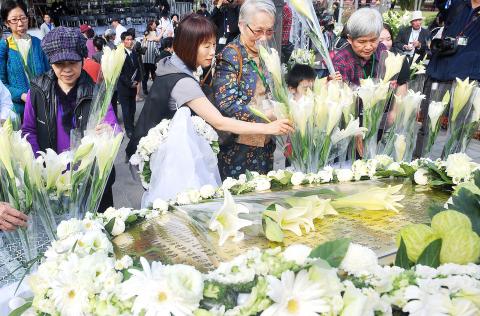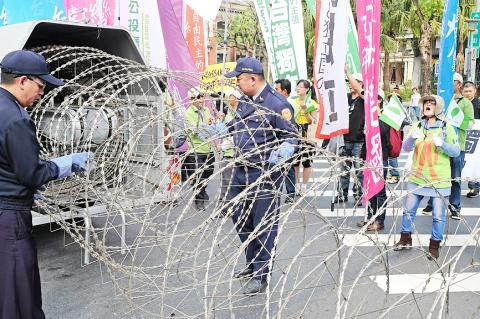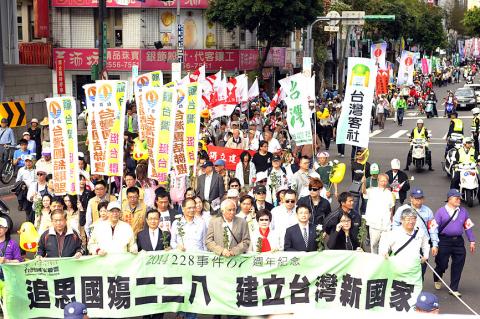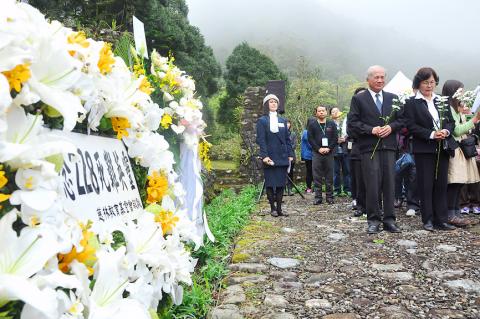The truth behind the 228 Massacre remains incomplete after 67 years and only when the whole truth is revealed can there be a guarantee that the tragedy will not happen again, victims, their families and activists said yesterday as they commemorated the anniversary of the 228 Incident.
After the nation’s democratization in the 1990s, it was no longer taboo to talk about the massacre, a watershed incident in Taiwan’s history, which resulted in the deaths of tens of thousands of civilians — many of them intellectuals, politicians and the social elite — and created a climate of fear that left many Taiwanese reluctant to get involved in politics.
The incident that sparked the suppression of anti-government uprisings occurred on Feb. 27, 1947, but the bloody crackdown by forces of the then-Chinese Nationalist Party (KMT) regime began the following day.

Photo: Liao Chen-huei, Taipei Times
The complete archive of documents related to the massacre has yet to be disclosed, and academics and politicians still debate the course of the massacre, activists and representatives of the victims’ families said yesterday.
President Ma Ying-jeou’s (馬英九) administration, in particular, has been trying to distort history, describing the event as “people rebelling against misgovernment” and insisting that the money paid to the victims and their families was compensation rather than indemnity, they told hundreds of people attending a rally in Taipei.
The participants, mostly senior citizens, assembled yesterday afternoon in front of the Pegasus Teahouse (天馬茶房) on Nanjing W Road, where the Feb. 27 incident between a cigarette vendor and Tobacco Monopoly Bureau agents that led to the massacre occurred.

Photo: Sam Yeh, AFP
After a brief ceremony that began at 2:28pm, a march was held to the 228 Memorial Park and Liberty Square in front of the Chiang Kai-Shek Memorial.
“It takes more than repeated apologies from President Ma to put the massacre behind us. One of the biggest problems of the 228 Massacre, I would say, is that the government has never really tackled the issue head-on,” Taiwan 228 Care Association chairman Chen Yi-shen (陳儀深) said.
No individual who was involved in the massacre has been held responsible, Chen said.

Photo: Chen Chih-chu, Taipei Times
Activisits and victims’ families said they were hurt by the recent comment of Taipei mayoral aspirant Ko Wen-je (柯文哲), whose grandfather was a 228 victim, that identifying the prime culprit of the massacre is “unnecessary” and “looking to the future and forgetting the past” is more important.
Ko reiterated his views yesterday, saying that people should have a sense of “mercy” so that the painful memory could fade away.
Democratic Progressive Party (DPP) politicians attending the commemoration said they disagreed with Ko, with Chairman Su Tseng-chang (蘇貞昌) saying that “truth should come before forgiveness” and former vice president Annette Lu (呂秀蓮) saying that the historical chapter could not be closed easily because “misfortune would be repeated if we were not careful.”

Photo: CNA
Meanwhile, former DPP chairman Lin Yi-xiong (林義雄) paid tribute to a more personal incident at a church service yesterday morning, remembering his mother and young twin daughters who were murdered at his home on Feb. 28, 1980.
The unsolved murders occurred when Lin was in jail due to his role in the 1979 Kaohsiung Incident.
Lin yesterday confirmed he would take part in the establishment of a new political party, tentatively named the “Civil Assembly (公民組合),” saying that the party aims to be a progressive force.

Intelligence agents have recorded 510,000 instances of “controversial information” being spread online by the Chinese Communist Party (CCP) so far this year, the National Security Bureau (NSB) said in a report yesterday, as it warned of artificial intelligence (AI) being employed to generate destabilizing misinformation. The bureau submitted a written report to the Legislative Yuan in preparation for National Security Bureau Director-General Tsai Ming-yen’s (蔡明彥) appearance before the Foreign Affairs and National Defense Committee today. The CCP has been using cognitive warfare to divide Taiwanese society by commenting on controversial issues such as Taiwan Semiconductor Manufacturing Co’s (TSMC, 台積電) investments in the

INVESTIGATION: The case is the latest instance of a DPP figure being implicated in an espionage network accused of allegedly leaking information to Chinese intelligence Democratic Progressive Party (DPP) member Ho Jen-chieh (何仁傑) was detained and held incommunicado yesterday on suspicion of spying for China during his tenure as assistant to then-minister of foreign affairs Joseph Wu (吳釗燮). The Taipei District Prosecutors’ Office said Ho was implicated during its investigation into alleged spying activities by former Presidential Office consultant Wu Shang-yu (吳尚雨). Prosecutors said there is reason to believe Ho breached the National Security Act (國家安全法) by leaking classified Ministry of Foreign Affairs information to Chinese intelligence. Following interrogation, prosecutors petitioned the Taipei District Court to detain Ho, citing concerns over potential collusion or tampering of evidence. The

‘COMPREHENSIVE PLAN’: Lin Chia-lung said that the government was ready to talk about a variety of issues, including investment in and purchases from the US The National Stabilization Fund (NSF) yesterday announced that it would step in to staunch stock market losses for the ninth time in the nation’s history. An NSF board meeting, originally scheduled for Monday next week, was moved to yesterday after stocks plummeted in the wake of US President Donald Trump’s announcement of 32 percent tariffs on Taiwan on Wednesday last week. Board members voted to support the stock market with the NT$500 billion (US$15.15 billion) fund, with injections of funds to begin as soon as today. The NSF in 2000 injected NT$120 billion to stabilize stocks, the most ever. The lowest amount it

NEGOTIATIONS: Taiwan has good relations with Washington and the outlook for the negotiations looks promising, Minister of Economic Affairs J.W. Kuo said Taiwan’s GDP growth this year is expected to decrease by 0.43 to 1.61 percentage points due to the effects of US tariffs, National Development Council (NDC) Minister Paul Liu (劉鏡清) said at a meeting of the legislature’s Economics Committee in Taipei yesterday, citing a preliminary estimate by a private research institution. Taiwan’s economy would be significantly affected by the 32 percent “reciprocal” tariffs slapped by the US, which took effect yesterday, Liu said, adding that GDP growth could fall below 3 percent and potentially even dip below 2 percent to 1.53 percent this year. The council has commissioned another institution